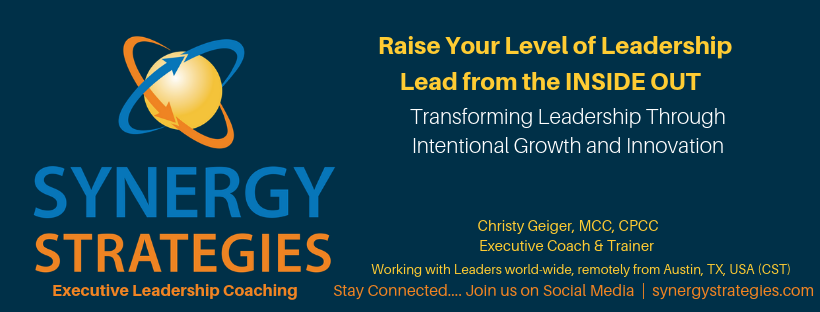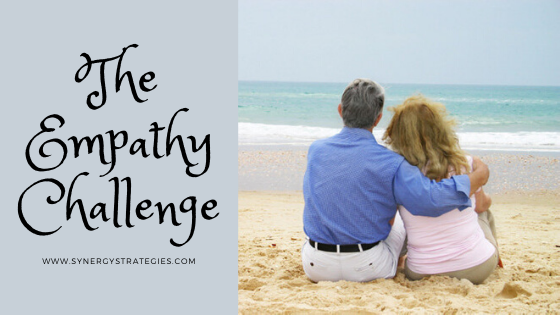In life and as leaders, we need to manage our own thoughts and emotions as well as balance an understanding of those around us. When there is high demand, pressure or stress around us, it can be especially difficult to be patient, understanding and receptive, much less empathetic. Empathy is part of leadership. When our team and those around us are in the midst of emotional flux, empathy is greatly needed. When people struggle emotionally, human empathy is what helps to restore a sense of security, connection, and balance. It allows people to shift from a fight, flight or freeze state and return to one of hope, health, and action.
Psychologists describe three types of empathy: cognitive, emotional and compassionate. (*Heartmanity has a great article about this if you want to dig deeper.) The three areas were helpful to understand how people exhibit different types of empathy, which may be more or less effective. Some, while extending empathy can feel cold and non-empathic, some might feel deeply and start spinning in the situation while others are able to move forward. What is the difference and how do you have empathy and keep moving forward?
Here is my take on the three types of empathy.
HEAD EMPATHY. Head empathy is commonplace for leaders, especially those who have a “task-centric” personality. We learn to balance our emotions and look at the facts. Head empathy will seek data and numbers to remove the emotional roller coaster that can get leaders to make emotional and erratic decisions. Head empathy sounds like: “The numbers are increasing; we might need to consider some action.” “According to the data, I can’t see why we wait until there is more information.” “I understand you are nervous, but the demand is not enough to justify that change yet.”
While head empathy is an important “heartbeat” to be consistent and reliable, head empathy can feel cold and invalidating when emotions or intuition says there is something to check out or be concerned about. Head empathy can lead to a cautious approach that is slow and steady. While there is a time and place for this, it can cause others to feel frustrated and tip to “overreacting, as head empathy can appear to be “under” reacting. This gap can cause both sides to feel more entrenched in their view and disregard the other view as one seems too emotional and one seems too logical or factual.
HEART EMPATHY. Heart empathy is very natural for people who are more “people-centric”. It is also a growing soft skill taught in leadership today. It challenges the leader to be more authentic and vulnerable, sharing their emotions as well as sensitive to the “human being” versus the “human doing”. It asks leaders to understand the “Why?” and “What?” is happening for people, not just judging their activity and actions. By doing this leaders can have a greater heart and connection with people.
The challenge of heart empathy comes when we take on the feelings of others or internalize them. When we are present and understanding how others are feeling, it can be easy to start feeling the same way, as we are emotionally influenced, relate to their thinking and start to feel that way as well. This often happens with stress, worry, anxiety, fear, sadness, anger, annoyance, etc. When we take on their feelings, we add them to our own feelings. Sometimes we might not take on others’ feelings but their feelings can activate our own emotions causing us to feel defensive, attacked, annoyed, helpless, criticized, incompetent, inadequate, etc. Both types of emotional empathy can lead to our own circular energy. Often when heart empathy is deeply internalized it can lead to stress, burnout, spinning, indecision, overwhelm, depression, hopelessness, struggle and more.
COMPASSION EMPATHY. Compassion empathy is a blend of the previous two and a great goal for every leader. It holds a blend of head empathy (understanding facts and grounded thinking) with heart empathy (emotionally what is happening for people) which when filtered through a lens of the big picture, leads to needed action. The ability to hold both head and heart in a big picture perspective is critical to leadership especially in times of stress and crisis. It does not go too far to over or under-reacting; rather it understands both sides while at the same time looks up and out. Holding this type of empathy allows a leader to come from their frontal lobe where they are able to access solutions and make decisions while being understanding of the condition of the human being. It is not cold and seemingly heartless to people. It is not overly emotional but rather balanced with head, heart and big picture. It provides needed context and has the ability to give reassurance, insight and a plan to respond.
Really empathy is an Emotional Intelligence skill, which as humans we can constantly develop and improve. Emotional Intelligence helps us have an awareness and ability to manage ourselves and interact socially with others. This helps us better connect with people we care about in all relationships (family and friends, coworkers, acquaintances, neighbors, etc.). Developing our emotional intelligence allows us to have compassion empathy with a balance of head, heart and big picture. It enables us to be aware of our own thoughts and feelings and manage those while at the same time holding the thoughts and feelings of others. A healthy regard for each allows true compassion empathy and a path to navigate forward in a healthy way.
‘* https://blog.heartmanity.com/the-three-kinds-of-empathy-emotional-cognitive-compassionate



